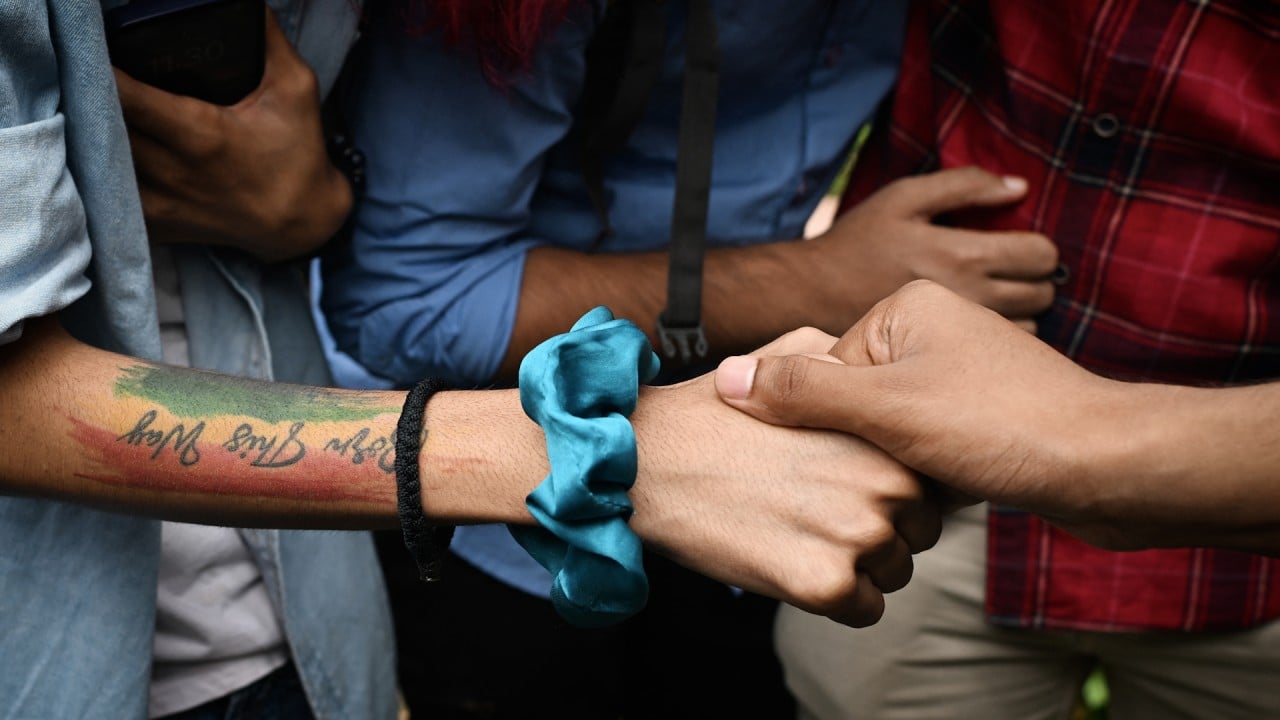“So I take that opportunity to incorporate fun and humour in my shows, to talk about gender equality, inclusion and diversity.”

This growing open-mindedness in a traditionally conservative country has created a climate in which some schools are happy to have drag artists visit.
When they sing, dance and tell stories about gender-neutral fictional characters to children, drag artists say it creates awareness about equality that encourages kids to be curious about the lives of transgender people and to ask about pride marches, same-sex marriages and LGBTQ rights.
Brazil drag queen fights hate with children’s stories
Brazil drag queen fights hate with children’s stories
Delhi-based drag artist Lush Monsoon, 30, whose legal name is Aishwarya Ayushman, said children may not understand the “politics” of gender discrimination and societal attitudes towards homosexuality, but they understand when she urges them to “be themselves”.
“Through my performance, I want children to feel that it’s OK for a boy to like pink and play with dolls, while it is OK for a girl not to like that colour or be more loud and expressive than boys,” Monsoon said.
Explaining that her performances are meant to give children a sense of empathy so they need not “fear the unknown”, Monsoon said when she was growing up, no one told her it was OK to veer from norms, meaning it took her much longer to break down societal barriers that prevented her from accepting herself.
“Therefore, I want these children to realise it early, and not feel discriminated against,” Monsoon said.

Bengaluru-based drag queen Maya, 36, whose legal name is Anish Mathew, has performed at schools for a number of years. In 2016, teachers at an international school in Bengaluru invited him to perform to raise sensitivity about gender issues after a male student was bullied by his classmates for wearing a sari on the school’s dress-up day.
He believes his drag performances provide a gender awareness that Indian students are not exposed to through regular sex education in school.
In India’s schools, sex education is inconsistently implemented, with issues related to mental well-being, sexual and reproductive health and sexual violence only haphazardly covered by secondary and senior secondary schools across the nation.
Drag artists say their performances in schools aim to end such harmful behaviour among children.
Monsoon said the recent controversy and bans on drag performances in the US have had a cascading effect on Indian drag shows for kids, prompting many schools in the Indian capital of New Delhi to stop inviting them.
Three states in the United States – Tennessee, Texas and Montana – recently passed laws banning drag artists from performing in certain public spaces, mainly aimed at blocking drag queen story hour events in which they read to children.
Drag artists in India are now battling online trolls who call them “bad influences” on children, Monsoon said.
Some netizens even share doctored videos to falsely implicate drag artists in presenting sexually explicit content in front of children, Maya said.
Audience for change: Delhi queer literary fest urges publishers to ‘take risks’
Audience for change: Delhi queer literary fest urges publishers to ‘take risks’
Stressing that drag shows in schools are “extremely safe” for children and not sexually explicit, Sastry said they aimed to gain acceptance of “queer culture as a mainstream culture”.
“My drag shows in schools revolve around themes of acceptance of ‘others’ and self-love with the aim of providing valuable learning experiences for young minds,” said Sastry, who adapts folk art forms such as pagati veshalu, a form of folk theatre from the southern state of Andhra Pradesh, and chhau dance from eastern state of West Bengal.
Oshun Maia, a learning partner at the Hyderabad’s Vision Rainbow school that invited Sastry for a drag performance in 2019, said sexuality is a potent and often sidelined aspect of human development and growth in India, leading it to be neglected and distorted. Drag performances, Maia said, are the means to “peel off the useless excess” from topics that matter.
“The message is strong and clear that this is something that we can talk about and explore out in the open with each other,” Maia said. “I believe the curiosity of children towards gender and its many forms is not something to be ashamed of, therefore we provide safe spaces to discuss them.”


